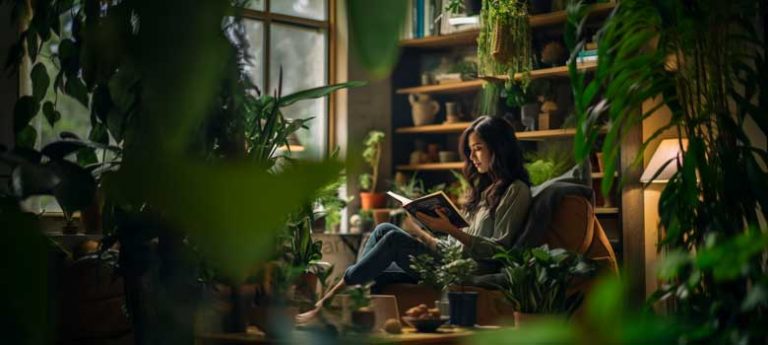12 Feng Shui Plants: Virtues and Astrological Associations
© KarmaWeather by Konbi - All rights reserved
Feng Shui, the millennial art of harmonizing energies, has always valued the role of plants in balancing and revitalizing a space. In this article, we take a look at 12 must-have indoor plants that not only beautify your environment, but also bring positive energy and promote well-being.
Each plant is carefully paired with Chinese and Western zodiac signs, providing a rewarding perspective on how these plants may resonate with your star sign. Whether you're looking to attract prosperity, purify your space, or simply add a touch of greenery, these Feng Shui plants are the perfect starting point for any astrology enthusiast.
☯ The harmonization of the 5 Feng Shui elements
Bamboo
- Scientific name: Bambusa vulgaris
- Lucky score: 10/10
- Chinese zodiac sign: Monkey, Rat
- Zodiac sign: Capricorn, Cancer
- Ideal location: Living room, office or garden
Good luck and Feng Shui virtues: Bamboo is one of the most popular plants in Feng Shui philosophy for attracting positive luck. It is often associated with resilience, flexibility and rapid growth, reflecting the ability to adapt and grow in any situation. In Feng Shui, bamboo is also considered a symbol of good fortune, especially when given as a gift.
The number of bamboo stems also has a special meaning:
- 3 stalks of bamboo for happiness
- 5 stalks of bamboo for health
- 7 stalks of bamboo for wealth
- 8 stalks of bamboo for prosperity
Maintenance level: Easy
Bamboo is a hardy plant that requires little maintenance, making it ideal for beginner gardeners or those who don't have a lot of time to devote to gardening.
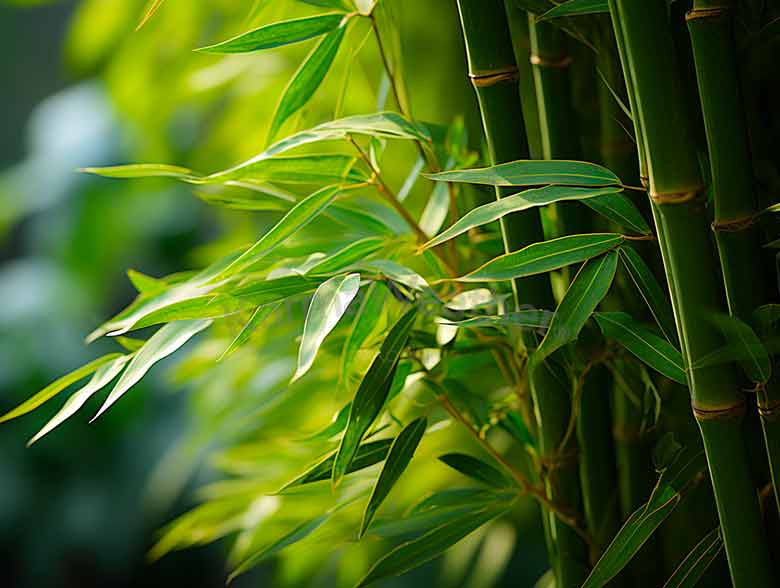
Feng Shui lucky plant: Bamboo © KarmaWeather by Konbi Care advice
- Watering: Bamboo does not like having its feet in water. Make sure the pot or vase has good drainage. Water moderately, keeping the soil slightly moist but never soggy. If you are growing bamboo in water, change the water every two weeks to prevent the roots from rotting.
- Fertilizer: Use a diluted liquid fertilizer every two months during the growing season (spring and summer). If your bamboo is in water, add a few drops of liquid fertilizer once a month.
- Type of soil: A mixture of universal potting soil and sand is ideal to ensure good drainage.
Bamboo is a versatile plant that can thrive both in pots and in vases with water. Its simple maintenance and good luck charms make it a popular choice for many homes and offices.
Orchid
- Scientific name: Orchis
- Lucky score: 9/10
- Chinese zodiac sign: Rabbit, Pig
- Zodiac sign: Taurus, Scorpio
- Ideal location: Bedroom or bathroom
Good luck and Feng Shui virtues: The orchid is a symbol of beauty, fertility, and refinement. In Feng Shui, this flower of tropical origin is often associated with perfection and spiritual balance. Its ability to grow in many climates also makes it symbolic of perseverance and resilience. Orchid flowers, with their natural elegance, are considered to have feminine energy, bringing harmony and balance into the home. Giving an orchid is often seen as a gesture of love and admiration.
Maintenance level: Moderate
Orchids require special care, but once you understand their needs, they can be relatively easy to care for.
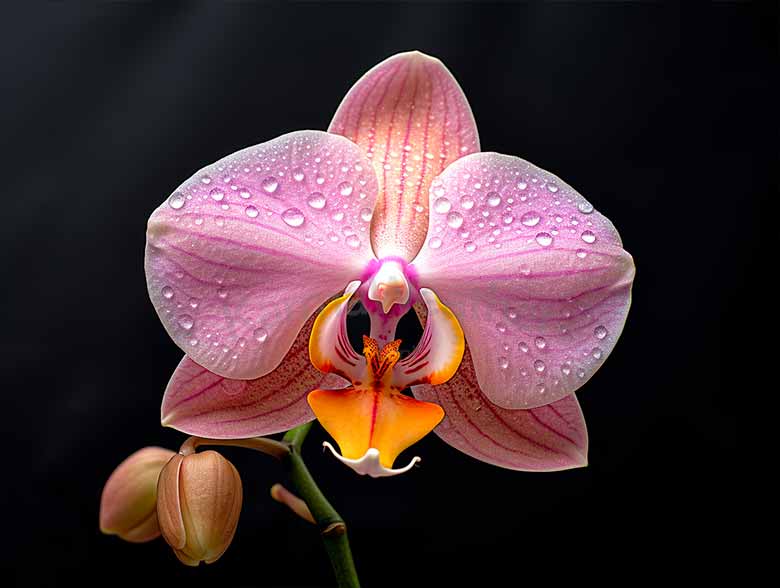
Feng Shui lucky plant: Orchid © KarmaWeather by Konbi Care advice
- Watering: Orchids don't like to be constantly wet. Water them once a week, letting the water run off completely. Make sure the pot has good drainage. If the roots are green and firm, your orchid is well hydrated. If they turn silver or gray, it's time to water.
- Fertilizer: Use a specific orchid fertilizer, diluted to half the recommended strength, every two to three weeks during the growing season.
- Type of soil: Orchids require an airy growing medium. Use a specific mix for orchids, usually consisting of pine bark, charcoal and perlite or sphagnum moss.
Orchids, with their delicate flowers and exotic appearance, can add a touch of elegance to any room. Although they require a little more attention than some other houseplants, the rewards, in the form of spectacular blooms, are well worth it.
Pachira
- Scientific name: Pachira aquatica
- Lucky score: 9/10
- Chinese zodiac sign: Monkey, Dragon
- Zodiac sign: Virgo, Libra
- Ideal location: Living room or office
Good luck and Feng Shui virtues: Pachira, often referred to as the "money plant tree", is widely believed to attract wealth and prosperity. In Feng Shui, it is considered a symbol of good fortune, especially when placed in areas associated with wealth or career. Its robust growth and glossy leaves are said to reflect economic growth and financial health. Legend has it that a lowly Taiwanese farmer made a fortune selling pachira plants, furthering his reputation as a lucky charm.
Maintenance level: Easy
Pachira is a hardy plant that is quite tolerant of a variety of conditions, making it ideal for gardeners of all skill levels.
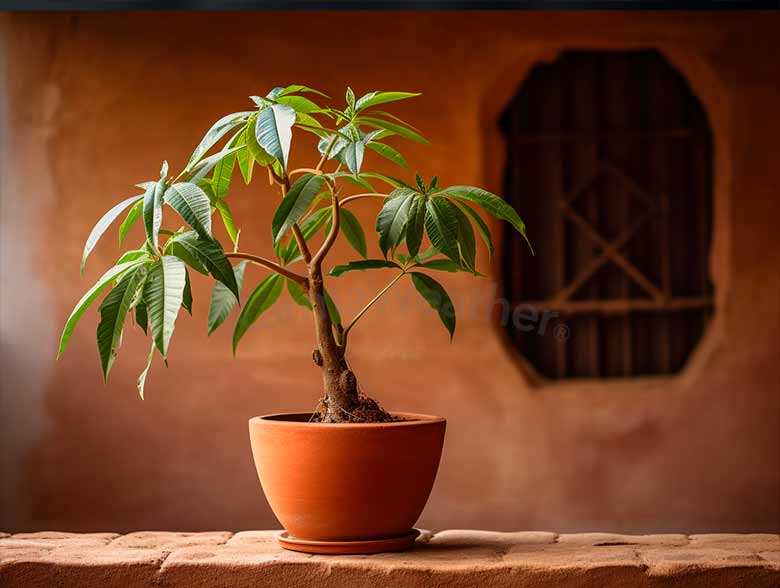
Feng Shui lucky plant: Pachira © KarmaWeather by Konbi Care advice
- Watering: The pachira does not like to be overwatered. It is best to let the soil dry out between waterings. Water moderately and make sure the pot has good drainage to prevent the roots from rotting.
- Fertilizer: Use a diluted universal fertilizer every two months during the growing season.
- Type of soil: A universal potting mix with good drainage is ideal. You can add sand or perlite to improve drainage if needed.
Pachira is a versatile plant that can thrive both indoors and outdoors, as long as it is protected from extreme temperatures. Its simple maintenance and reputation as a lucky charm make it a popular choice for many homes and offices.
Tulsi
- Scientific name: Ocimum tenuiflorum
- Lucky score: 9/10
- Chinese zodiac sign: Snake, Tiger
- Zodiac sign: Leo, Aries
- Ideal location: Kitchen or garden
Good luck and Feng Shui virtues: Tulsi, also known as holy basil, is revered in many cultures for its medicinal and spiritual properties. In Feng Shui, it is considered a powerful energy purifier, capable of eliminating negative energies and stimulating positivity. It is often associated with protection, purification and the invocation of prosperity. In Hindu tradition, tulsi is considered sacred and is often planted around temples and homes to purify the atmosphere and bring divine blessing.
Maintenance level: Moderate
Tulsi requires special attention, especially with regard to light and watering, but it is rewarded with its fragrant leaves and beneficial properties.
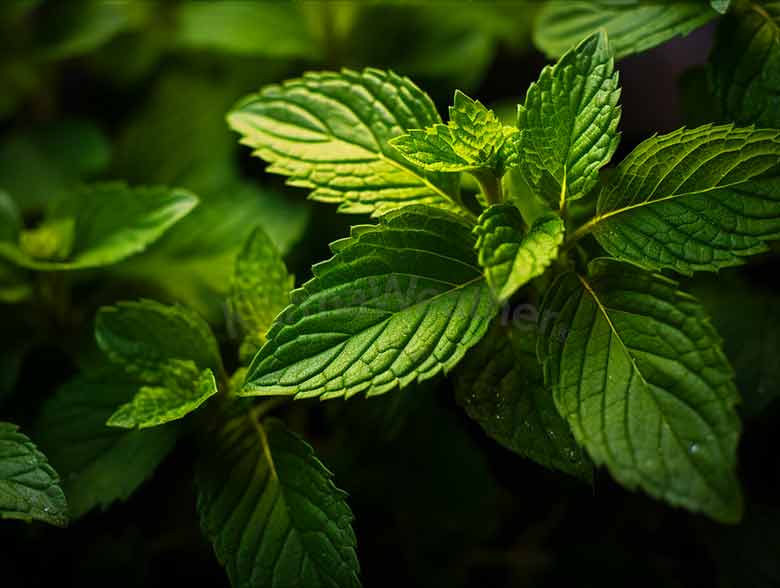
Feng Shui lucky plant: Tulsi © KarmaWeather by Konbi Care advice
- Watering: The tulsi plant prefers well-drained soil and does not like having constantly wet feet. Water regularly but allow the soil to dry out between waterings.
- Fertilizer: Use diluted organic fertilizer once a month during the growing season. Compost or well-rotted manure can also be added to enrich the soil.
- Type of soil: A rich, well-drained potting mix is ideal for tulsi. You can add compost or sand to improve the texture if needed.
Tulsi is a versatile plant that can be grown both in pots and in the ground. In addition to its Feng Shui virtues, it can be used in cooking or herbal tea for its medicinal properties.
Philodendron Monstera
- Scientific name: Monstera deliciosa
- Lucky score: 8/10
- Chinese zodiac sign: Ox, Rooster
- Zodiac sign: Taurus, Capricorn
- Ideal location: Living room or dining room
Good luck and Feng Shui virtues: Monstera, with its towering, serrated leaves, is a symbol of growth and expansion. In Feng Shui, it is often associated with prosperity, good health, and wealth. Its lush presence can help balance and harmonize the energy of a room, bringing a feeling of renewal and vitality. Its ability to purify the air also enhances its role as a plant that promotes positive and healthy energy.
Maintenance level: Moderate
Although Monstera is relatively easy to care for, it has specific light and humidity requirements to thrive.
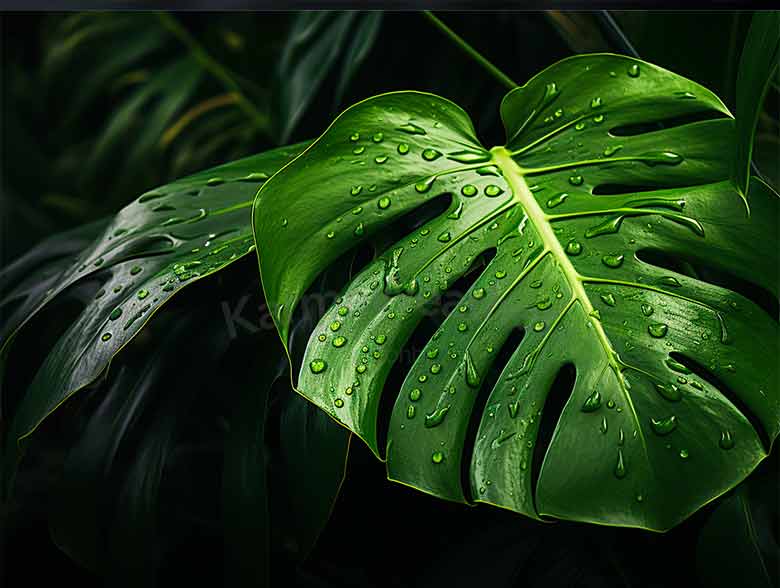
Feng Shui lucky plant: Philodendron Monstera © KarmaWeather by Konbi Care advice
- Watering: Monstera prefers soil that stays slightly moist, but not soggy. Water when the top 5cm of soil feels dry to the touch. Reduce watering during the winter months.
- Fertilizer: Use a balanced liquid fertilizer monthly during the growing season (spring and summer). Be sure to water well before and after application to avoid burning the roots.
- Type of soil: A rich, well-drained potting soil mix is ideal. You can add perlite or sand to improve drainage.
Philodendron Monstera is a popular houseplant that can add a tropical flair to any space. With a little attention to its needs, it can thrive and become an impressive focal point in your home.
Pothos
- Scientific name: Epipremnum aureum
- Lucky score: 8/10
- Chinese zodiac sign: Horse, Dog
- Zodiac sign: Sagittarius, Gemini
- Ideal location: Office or bedroom
Good luck and Feng Shui virtues: Pothos, also known as devil's ivy, is a popular houseplant for its ability to thrive in a variety of conditions. In Feng Shui, it is recognized for its ability to purify the air and eliminate negative energies. Its rapid growth symbolizes progression and advancement, making it an ideal plant for work or study spaces. Additionally, its drooping nature is believed to help "capture" fortune and luck, thus keeping it in the house.
Maintenance level: Easy
Pothos is one of the most tolerant and easy to care for houseplants, making it ideal for beginning gardeners.
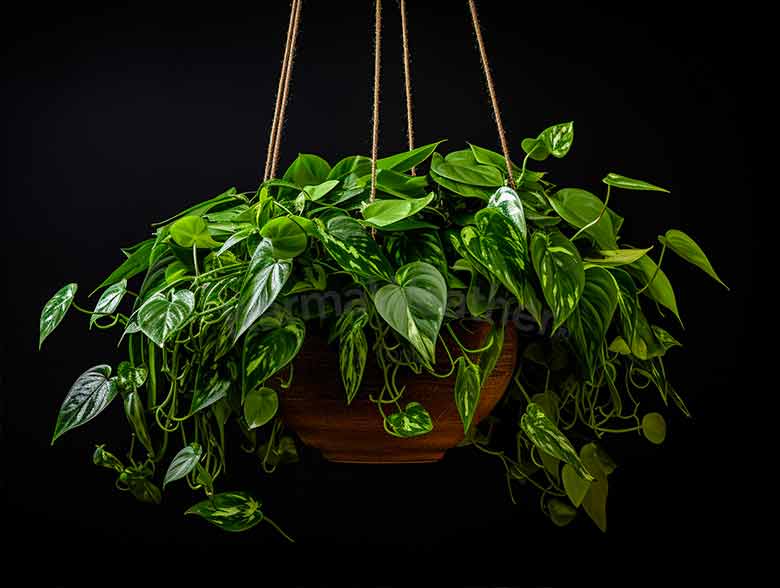
Feng Shui lucky plant: Pothos © KarmaWeather by Konbi Care advice
- Watering: Pothos prefers to be watered when the soil is dry to a depth of about 2-3 cm. It is tolerant of neglect, but does not like to be constantly wet.
- Fertilizer: Use a balanced liquid fertilizer every two months during the growing season. Since it is not particularly demanding in nutrition, excessive feeding is not necessary.
- Type of soil: A well-drained all-purpose potting soil is fine. If you want to improve drainage, you can add a little perlite or sand to the mix.
Pothos is a versatile plant that can be grown in pots or hanging. Its heart-shaped leaves and drooping nature make it a charming addition to any room, while providing Feng Shui benefits.
Jade Plant
- Scientific name: Crassula ovata
- Lucky score: 8/10
- Chinese zodiac sign: Monkey, Ox
- Zodiac sign: Virgo, Capricorn
- Ideal location: Office or living room
Good luck and Feng Shui virtues: The jade plant, often referred to as the "wealth plant" or crassula ovata, is widely recognized in Feng Shui to attract prosperity and financial luck. It symbolizes stable growth and longevity, thus reflecting continued prosperity and good financial health. Traditionally it is placed near the entrance to homes or offices to invite wealth and abundance. Its fleshy leaves, which look like jade stones, are considered symbols of wealth and abundance.
Maintenance level: Moderate
The jade plant is a succulent, which means it stores water in its leaves and requires less watering than other houseplants.
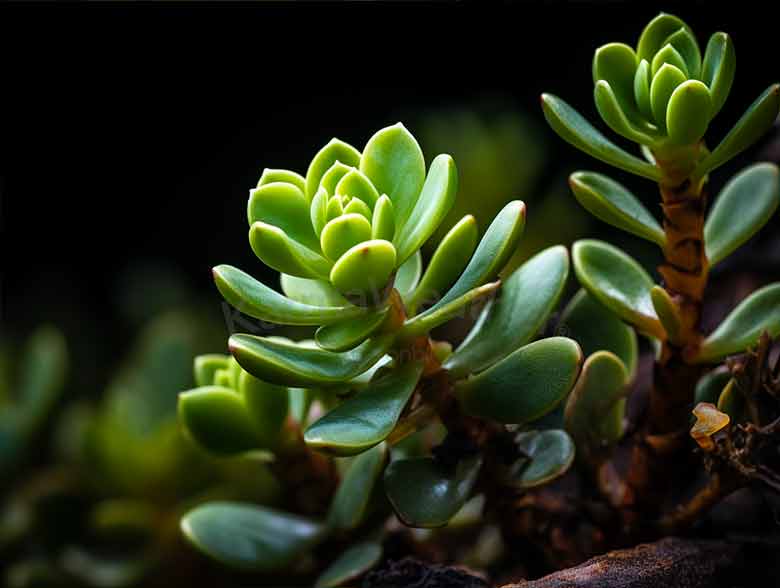
Feng Shui lucky plant: Jade Plant © KarmaWeather by Konbi Care advice
- Watering: Water moderately, allowing the soil to dry out completely between waterings. During the winter months, reduce watering even further.
- Fertilizer: Use a specific fertilizer for succulents in spring and summer, following label directions for dilution.
- Type of soil: A specific mix for succulents is ideal, as it provides good drainage. If you're making your own mix, combine Universal Potting Soil with coarse sand or perlite to improve drainage.
The jade plant is a charming addition to any room, with its plump, shiny leaves and sturdy growth. Not only is it beautiful, but it is also considered a symbol of wealth and prosperity in Feng Shui.
Indoor Palm Tree
- Scientific name: Dypsis lutescens
- Lucky score: 8/10
- Chinese zodiac sign: Tiger, Horse
- Zodiac sign: Leo, Aries
- Ideal location: Living room or veranda
Good luck and Feng Shui virtues: The indoor palm tree, with its elegant, arching leaves, is a symbol of peace, serenity and victory. In Feng Shui, it is recognized for its ability to stimulate positive energy, eliminate negative energy and purify the air. Its presence is reminiscent of tropical climates and can bring a sense of vacation and relaxation to any space. Placing an indoor palm tree in a room can help balance energy, promote personal growth, and bring a sense of renewal.
Maintenance level: Moderate
Indoor palms require special attention when it comes to light, watering, and humidity.

Feng Shui lucky plant: Indoor Palm Tree © KarmaWeather by Konbi Care advice
- Watering: Indoor palms prefer well-drained soil and don't like to be constantly wet. Water when the top 2-3cm of soil feels dry to the touch. Reduce watering during the winter months.
- Fertilizer: Use a balanced liquid fertilizer monthly during the growing season. Be sure to water well before and after application to avoid burning the roots.
- Type of soil: A rich, well-drained potting soil mix is ideal. You can add perlite or sand to improve drainage.
The indoor palm is an elegant plant that can add a tropical flair to any indoor space. With a little attention to its needs, it can thrive and become a calming focal point in your home.
Feng Shui advice: Be careful not to place your indoor palm near an armchair and even less in a bedroom, because its spiked foliage can be considered as so many "poison arrows". In general, the precepts of Feng Shui tend to favor plants with oval leaves.
Snake Plant
- Scientific name: Sansevieria Trifasciata
- Lucky score: 7/10
- Chinese zodiac sign: Rat, Rooster
- Zodiac sign: Scorpio, Cancer
- Ideal location: Office or bedroom
Good luck and Feng Shui virtues: Snake plant, also known as Sansevieria or "Mother-in-Law's Tongue", is renowned for its hardiness and ability to thrive in harsh conditions. In Feng Shui, it is valued for its ability to purify the air by removing toxins, making it an excellent plant for improving indoor air quality. She is also considered a protector, keeping negative energies at bay. Its vertical shape is believed to stimulate upward energy, promoting growth and renewal.
Maintenance level: Easy
The snake plant is extremely tolerant and low maintenance, making it ideal for novice gardeners or those who tend to forget to water.
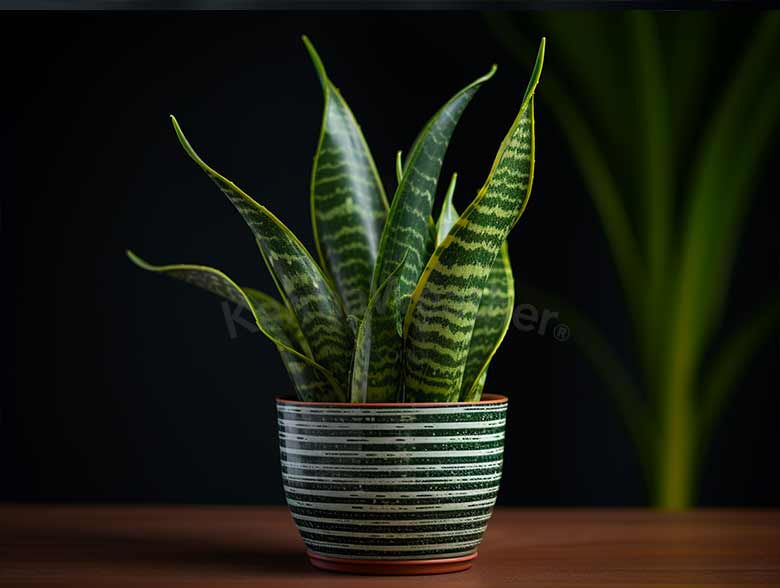
Feng Shui lucky plant: Snake Plant © KarmaWeather by Konbi Care advice
- Watering: The snake plant is a succulent plant that stores water in its leaves. It prefers to be watered less frequently. Water thoroughly, then let the soil dry out completely before watering again.
- Fertilizer: The snake plant does not need a lot of fertilizer. Adding diluted houseplant fertilizer in spring and summer is sufficient.
- Type of soil: A mix for cacti or succulents is ideal because it provides good drainage. If you are making your own mix, combine universal potting soil with coarse sand.
The snake plant is not only aesthetically pleasing with its distinctive patterns, but it is also an air purifying champion. It is perfect for anyone looking for a low maintenance houseplant that still provides Feng Shui benefits.
Peace Lily
- Scientific name: Spathiphyllum
- Lucky score: 7/10
- Chinese zodiac sign: Rabbit, Goat
- Zodiac sign: Pisces, Taurus
- Ideal location: Living room or bedroom
Good luck and Feng Shui virtues: The spatiphyllum, commonly known as "peace lily", is a houseplant appreciated for its elegant white flowers and its purifying properties. In Feng Shui, it is recognized for its ability to bring peace, harmony, and serenity to a space. Its presence is believed to foster a peaceful environment, helping to dispel conflict and encourage mutual understanding. Moreover, it is also reputed to be one of the best depolluting plants, helping to purify the air of common toxins.
Maintenance level: Moderate
The peace lily requires special attention when it comes to watering and light, but with the right care it can bloom steadily.
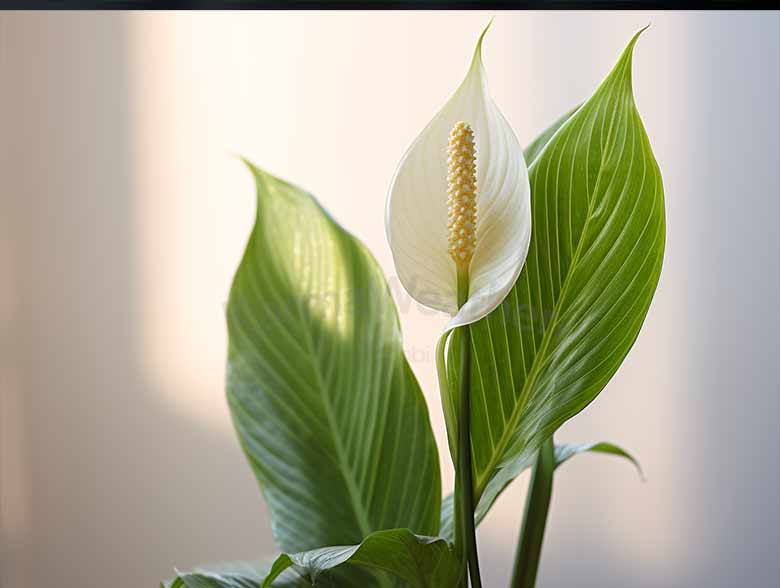
Feng Shui lucky plant: Peace Lily © KarmaWeather by Konbi Care advice
- Watering: The spatiphyllum prefers constantly moist, but not soggy, soil. It is sensitive to both underwatering and overwatering. If its leaves start to wilt, it may be a sign that it needs water.
- Fertilizer: Use a balanced liquid fertilizer monthly during the growing season to encourage flowering.
- Type of soil: A rich, well-drained soil is ideal. You can add perlite or sphagnum moss to improve texture and drainage.
The peace lily is an elegant houseplant that can add a touch of tranquility to any space. Its white flowers and lush green leaves make it a popular choice for those looking to bring a bit of nature and serenity into their homes.
Chinese Money Plant
- Scientific name: Pilea peperomioides
- Lucky score: 7/10
- Chinese zodiac sign: Monkey, Dragon
- Zodiac sign: Libra, Aries
- Ideal location: Office or living room
Good luck and Feng Shui virtues: Pilea, often nicknamed "coin plant", is a charming houseplant with its small, round leaves reminiscent of coins. In Feng Shui, it is associated with prosperity, abundance, and wealth. Its round shape and shiny leaves are believed to symbolize metallic money, thus attracting fortune and financial luck. Placing a pilea in your workspace or living room can help boost positive energy linked to prosperity and financial growth.
Maintenance level: Easy
Pilea is a hardy houseplant that requires little maintenance, making it ideal for gardeners of all skill levels.
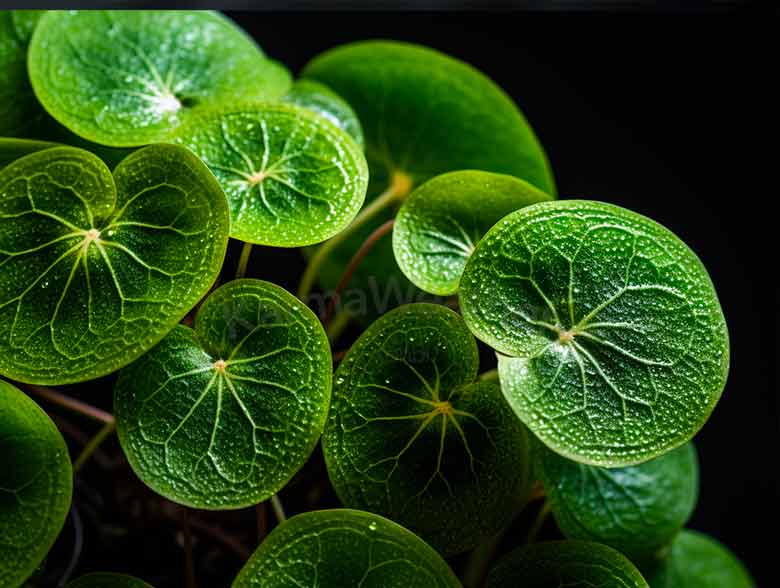
Feng Shui lucky plant: Chinese Money Plant © KarmaWeather by Konbi Care advice
- Watering: Pilea does not like to be overwatered. Water moderately, allowing the soil to dry out between waterings. If the leaves start to wilt or fall off, it may be a sign of underwatering.
- Fertilizer: Use a balanced liquid fertilizer every two months during the growing season to encourage healthy growth.
- Type of soil: A well-drained soil is ideal. You can add perlite or sand to improve drainage.
The Chinese Money Plant is an attractive houseplant that can add a touch of greenery and prosperity to any space. Its unique leaves and easy care make it a popular choice for many houseplant enthusiasts.
Sage
- Scientific name: Salvia officinalis
- Lucky score: 7/10
- Chinese zodiac sign: Snake, Pig
- Zodiac sign: Sagittarius, Pisces
- Ideal location: Cuisine ou jardin
Good luck and Feng Shui virtues: Sage is an aromatic plant that has long been associated with purification and protection. In Feng Shui, it is used to eliminate negative energies and to purify a space. Burning dried sage leaves, a practice known as smudging, is a traditional method of clearing a space of unwanted energies. Additionally, sage is also associated with wisdom, mental clarity, and spirituality. Its presence in the kitchen or garden can help bring soothing energy and encourage spiritual growth.
Maintenance level: Moderate
Sage is a hardy plant that prefers cooler climates, but it does require some attention with watering and light.
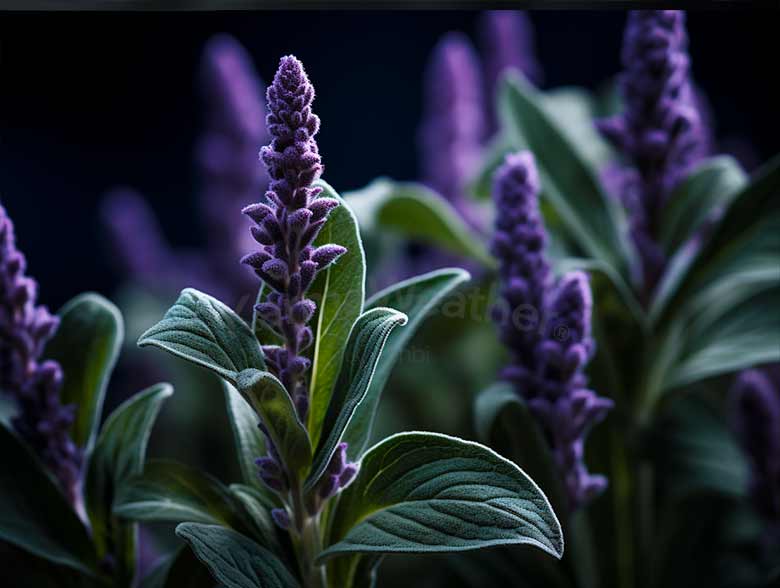
Feng Shui lucky plant: Sage © KarmaWeather by Konbi Care advice
- Watering: Sage prefers well-drained soil and does not like to be constantly wet. Water moderately, allowing the soil to dry out between waterings.
- Fertilizer: Use a diluted organic fertilizer in the spring to encourage healthy growth.
- Type of soil: A light, well-drained potting mix is ideal. You can add compost or sand to improve the texture.
Not only is sage a useful herb for cooking and cleansing rituals, but it's also beautiful with its velvety leaves and purple flowers. It can add a splash of color and fragrance to any garden or indoor space.
